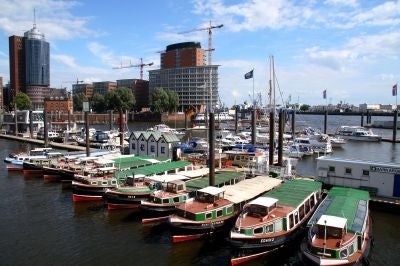Your support helps us to tell the story
From reproductive rights to climate change to Big Tech, The Independent is on the ground when the story is developing. Whether it's investigating the financials of Elon Musk's pro-Trump PAC or producing our latest documentary, 'The A Word', which shines a light on the American women fighting for reproductive rights, we know how important it is to parse out the facts from the messaging.
At such a critical moment in US history, we need reporters on the ground. Your donation allows us to keep sending journalists to speak to both sides of the story.
The Independent is trusted by Americans across the entire political spectrum. And unlike many other quality news outlets, we choose not to lock Americans out of our reporting and analysis with paywalls. We believe quality journalism should be available to everyone, paid for by those who can afford it.
Your support makes all the difference.According to the results of the Germany Green City Index study, released on June 21, German cities are greener than their neighboring European counterparts with Berlin being one of the best and Belgrade one of the worst. Information on several of the criteria included in the study, air quality and CO2 emissions for example, are available for members of the public to monitor online.
The study was commissioned by Siemens from independent research institute Economist Intelligence Unit (EIU). The study examined 29 European cities, 12 of which were in Germany, and ranked each of these cities in terms of energy efficient buildings, energy efficiency, transport, water use, recycling, air quality and CO2 emissions.
According to these criteria European cities were classified as follows:
Above average - Amsterdam, Berlin, Bremen, Brussels, Copenhagen, Frankfurt, Hamburg, Hanover, Helsinki, Leipzig, Mannheim, Munich, Nuremberg, Oslo, Stockholm, Stuttgart, Vienna, Zurich
Average - Cologne, Essen, London, Madrid, Paris, Riga, Rome, Vilnius, Warsaw
Below average - Athens, Bratislava, Budapest, Dublin, Istanbul, Lisbon, Ljubljana, Prague, Tallinn
Well below average - Belgrade, Bucharest, Kiev, Sofia, Zagreb
Information on several of the criteria used in the study - air quality for example - is available for members of the public in the European Union to view online. Other data, such as the quality of bathing water, are also accessible.
Air quality: http://www.airqualitynow.eu/
Ozone pollution: http://www.eea.europa.eu/maps/ozone/map
State of bathing water: http://www.eea.europa.eu/themes/water/interactive/bathing/quality
There are also a number of smartphone apps available which provide European environmental data including:
World Air Quality
http://itunes.apple.com/us/app/world-air-quality/id396958256?mt=8
Expair
http://itunes.apple.com/us/app/expair/id441755831?mt=8#
Cloud Health
http://itunes.apple.com/gb/app/cloud-health-radiation-monitor/id442794934?mt=8

Join our commenting forum
Join thought-provoking conversations, follow other Independent readers and see their replies
Comments